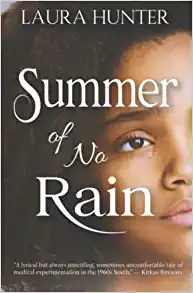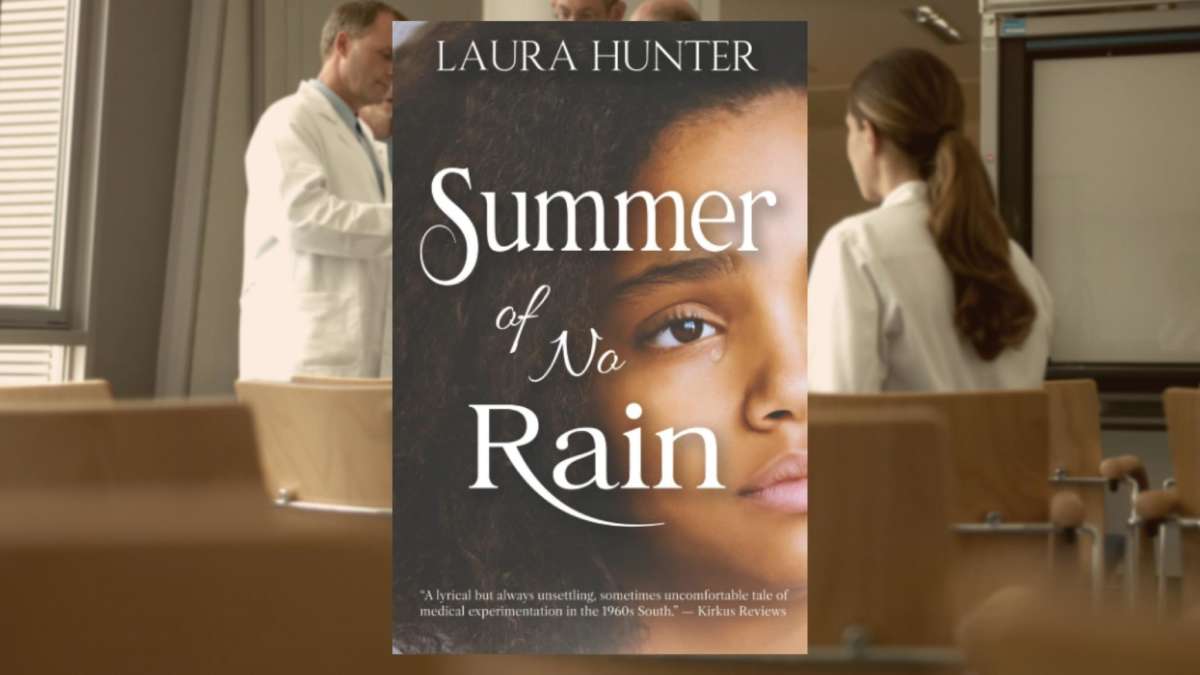Summer of No Rain by Laura Hunter
Summer of No Rain is a fictional retelling of a disturbing true story. In Alabama in 1973, the sisters Minnie Lee and Mary Alice Relf were forcibly sterilized as minors in a federally funded, systemically racist and ableist program disguised as “experimental birth control.” Laura Hunter has reimagined this haunting tale of racism, eugenics and the forced sterilization movement in her novella.
SYSTEMIC RACISM IN HEALTHCARE
The story follows Margaret Ann Odom, the mixed-race daughter of an illiterate Black housekeeper. Her father is a rich white man who controls most of the town’s businesses and services, though he barely provided his daughters and their mother with enough to live on before he left them.
When Miss Claire, a white social worker, begins to visit the local Black families to arrange clinic visits for their teenage girls, Margaret Ann’s mother, referred to as M’dear, signs the papers to approve her daughter’s preventative medical treatment. M’dear encourages the girl to take advantage of anything the town can offer, including the health clinic, never realizing that there is a more sinister reason for the free services.
SIDE-EFFECTS TOLD IN A HARROWING POV
Through the eyes of young Margaret Ann, we see as she begins to get sick, grow lesions and suffer from depression and suicidal thoughts. All the while, she tries her best to make sense of her medical visits, overhearing the word eugenics and misinterpreting it as “blue jennies,” not understanding why the doctors speak of making her “clean” when she has made sure to bathe.
Laura Hunter creates a staggeringly unsettling feeling throughout this book. The reader knows something that Margaret Ann doesn’t, but is compelled to witness her navigate this complicated new reality with child-like innocence.
Margaret Ann keeps going back to the clinic, desperate to live up to her mother’s expectations and to avoid disappointing her. “My thoughts were full of M’dear and all the pains she took to make sure I would have the best future she could create for me.” And later, when she is overcome by sickness but hides it from M’dear, “I didn’t want her to think I had failed her. I could take the pain, if it made her proud.” Margaret Ann thinks that her symptoms are part of preventative medical care and to deny treatment would be to throw away resources and risk her health. A life of poverty and racial discrimination has taught Margaret Ann to take what she can get, particularly if white people are freely offering it.
AN EMPLOYEE’S MORAL STRUGGLE
Beyond a focus on Margaret Ann’s forced sterilization, we get a glimpse into Miss Claire’s life with chapters that share her perspective. We learn her reasons for joining the clinic and see her moral struggle when she learns of the horrors that occur there.
Margaret Ann’s story is cleverly paralleled with a pregnant cow on the family’s farm and a schoolyard bully also carrying a child. She struggles with the same things that any young Black girl does, but those things all pale in comparison to the trauma of her sterilization, especially when she learns that the “treatments” have killed another young woman.
Summer of No Rain is an earnest historical portrayal of Black families in a rural Southern town, still living in the grips of racism and Jim Crow even in the midst of the Civil Rights Movement. It’s the story of the silent undercurrent of racist policies and of the people who stand by and let it happen.
READERS COME FACE-TO-FACE WITH HISTORY … AND CURRENT EVENTS
This novella, though written for young adults, tells a valuable story that any reader could benefit from learning about. Its subject matter is mature, revealing horrors that are not yet far enough in the past to justify being forgotten by anyone, young or old. But this story isn’t just historical fiction. Forced sterilization of disabled, Indigenous and Black people — particularly women — is still happening in the United States and across the world today under the protection of federal laws. Laura Hunter has told a relevant and necessary story with Summer of No Rain that pulls this issue to the forefront of our minds, where it should remain.
About Laura Hunter:
As a working retiree, Laura Hunter is doing just about everything she ever wanted to do: traveling, working with glass tiles, writing and spoiling a new puppy. She is currently revising a novel that is hopefully to be completed in the next year. Set in the Southeastern corner of Virginia, the novel is the story of two sisters and the daughter of the younger sister. It centers on the values of Cherokee and white and how both can impact lives both negatively and positively. Most of Hunter’s writing is short fiction, but she also works on longer pieces and nonfiction articles for various publications. You can find a listing of publications at her website, and she thanks you for looking her up.




